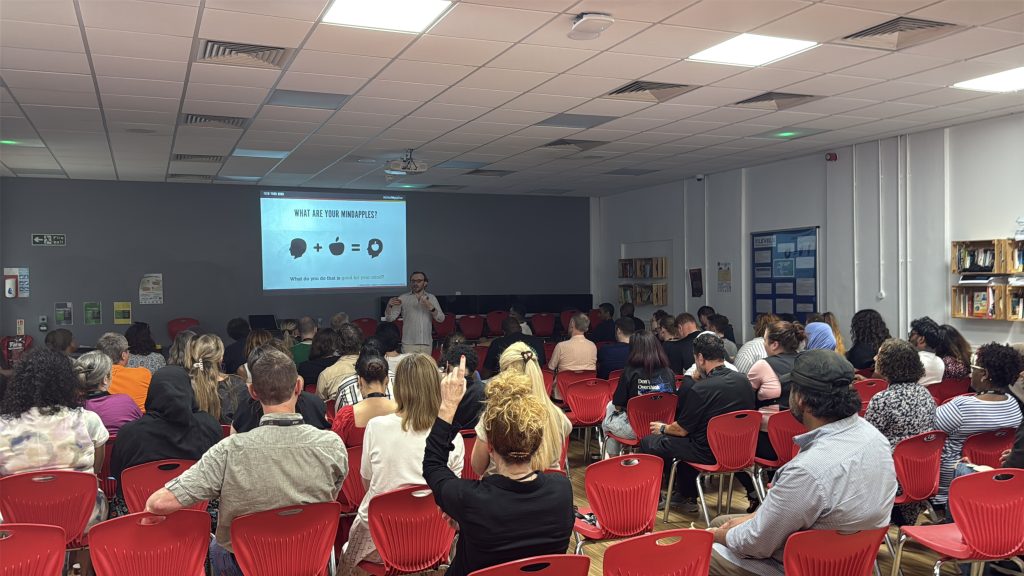
As schools break up for the summer, many teachers are finally catching their breath, stepping back from the whirlwind of lessons, planning, and pastoral care. This pause can be a chance to rest, but also to reflect: How am I really doing?
According to the Teacher Wellbeing Index 2024, 78% of school staff reported symptoms of stress or burnout last year, and 77% said their work had caused symptoms of poor mental health.
At Mindapples, we believe mental wellbeing shouldn’t just be crisis-driven. It can be part of the everyday. By equipping school staff with the space, tools, and simple practices, we can help minds flourish and help teachers thrive.
From pressure to possibility
When we speak to teachers, we hear about the quiet toll of constant pressure, juggling classroom needs with behaviour, parental expectations, inspections, and stretched staffing. These experiences are echoed in the NEU’s 2024 survey, 75% of teachers say they struggle to switch off after work, and 62% feel stressed more than half the time.
Yet while structural reform is needed, there’s also an urgent question to ask in the meantime: what can we do right now to help teachers take care of their minds in ways that are realistic, personalised, and genuinely supportive?
In many schools, wellbeing is discussed but not embedded. Support is often limited to twilight INSETs or one-off sessions, with little time or follow-up. There’s a gap between what’s offered and what’s experienced, and a need for support that fits the realities of school life.
That’s where Mindapples comes in. We draw on positive psychology, behavioural science and have a commitment to supporting self-awareness and agency, fields that focus on what helps people flourish, not just cope. Through everyday reflection, helpful habits, and greater understanding of our minds, we help people explore what supports their mental wellbeing.
And it all starts with a simple question: What’s good for your mind?
The Mindapples approach
At Mindapples, we believe mental wellbeing should be part of everyday life, not just something we turn to in crisis.
That’s why our work starts with a simple idea: What’s good for your mind? From our roots in the “5-a-day for the mind” campaign, we’ve developed a full programme of evidence-informed workshops and tools that help people understand how their minds work, and how to care for them.
For teachers, we offer practical, engaging sessions on topics like:
• Feed Your Mind: exploring how our habits and surroundings affect how we feel, and how simple daily actions can help our minds thrive
• Handle Pressure: understanding the psychology of stress and building practical strategies to manage pressure and reduce overload
• Sleep Well: exploring the connection between sleep and mental health, and learning how to build healthy routines for rest and energy
• Be Resilient: developing flexible, proactive mindsets to cope with change, bounce back from setbacks and support long-term wellbeing
All our sessions are grounded in research from psychology, neuroscience and behaviour change, and shaped by our Theory of Change, which focuses on self-awareness, autonomy, and simple cultural shifts that support long-term wellbeing.
These priorities echo the DfE’s Education Staff Wellbeing Charter, which calls on schools to:
• Prioritise staff wellbeing alongside pupil outcomes
• Give staff greater autonomy and agency
• Provide access to training and peer support
• Ensure leadership models a supportive culture
Mindapples helps schools turn these commitments into everyday practices through accessible tools and shared understanding.
The teachers we work with tell us the approach is refreshing: clear, practical, and grounded in science. And that it gives them tools to feel more in control of their minds and daily lives.
It’s a model that’s been used with thousands of people across schools, universities, charities and businesses. And in our most recent impact data, 91% of teachers said our workshops helped them reflect on their own wellbeing, while 84% said they felt more confident supporting students’ mental health too.
Seeing it in action at Leyton Sixth Form College
This month, Mindapples trainer Andrea visited Leyton Sixth Form College in East London to deliver our “Feed Your Mind” workshop to over 100 staff members. The session offered space in the school year to reflect, recharge and reconnect with what supports their own mental wellbeing.
Together, staff explored the small, daily actions, their “mindapples”, that help them feel grounded, focused and re-energised. People shared:
• Cuddling my cat
• Getting outside at lunchtime
• Ticking off countries on my travel map
Each of these seemingly simple habits is backed by evidence:
• Spending time with animals reduces cortisol and boosts oxytocin, helping regulate stress and improve emotional connection.
• Getting outdoors, even briefly, supports attention restoration and mood regulation.
• Pursuing meaningful goals, like travelling, learning or creating, can increase wellbeing and resilience.
Sessions like this remind us that it’s often the smallest changes that make the biggest difference. When staff are given time to think about their minds, they can reconnect with simple actions that help them feel more energised and in control of their day-to-day wellbeing.

Changing the conversation in schools
At Mindapples, we’re helping schools move beyond crisis-response to a culture where mental wellbeing is part of the everyday.
Our work aligns with the DfE’s Education Staff Wellbeing Charter and the Whole School Approach to Mental Health. And it’s trusted by educators across the UK who want to build healthier, happier school communities.
Because when teachers are supported to care for their minds, they’re better able to support each other, and their pupils too. We all want schools to be places where people thrive. Where staff feel energised, connected, and supported to do their best work.
We’re not here to fix everything. But we are here to help – with practical tools, shared language, and small, meaningful actions that support everyday wellbeing. If you’re ready to put mental health at the heart of your school culture, we’d love to hear from you.
